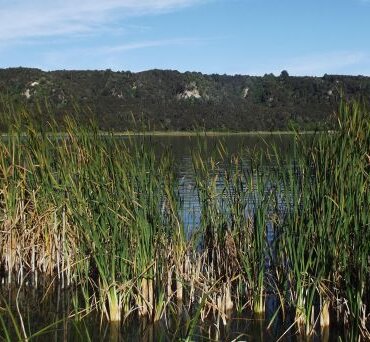
Lake Rotongaio
Experts highlight challenges and priorities for restoring Waikato lakes.

Lake Waahi and Puketirini as pictured in newly published book Hidden Gems of the Waikato
Waikato is home to a diverse range of lakes, and experts say they urgently need better management and restoration.
University of Waikato freshwater scientist Deniz Özkundakci says “a lot, if not most” of the hundreds of lakes in the region are significantly degraded and in urgent need of action to protect and restore their health.
“At the same time, we have some truly hidden gems – lakes that rank among the best in the country. The region includes the full spectrum of lake condition, from outstanding lakes to some of the most degraded,” he says.
The findings are part of a newly released book, a joint venture by the University of Waikato and the Waikato Regional Council.
Lakes often hold strong emotional value for people, whether it be childhood memories of learning to swim, fishing or water skiing to summer holidays with family, Özkundakci says.
However, farming and urban development has resulted in several lakes being much smaller and shallower than they were in the early 1900s.
Water quality remains one of the biggest concerns.
“Most of the lakes are all enriched in nutrients, particularly phosphorus and nitrogen from farmland runoff, causing algae bloom and turning the water a bright green and making it smell bad,” he says.
“In some lakes, aquatic plants have disappeared entirely. Where plants remain, they’re often overrun by invasive species. We’ve also lost many lake birds that relied on native plants and the food they provided.”
But it’s not all doom and gloom, says Özkundakci, who noted that many community groups have started to get involved in restoration efforts.

University of Waikato freshwater scientist Deniz Özkundakci
However, he says that “while promising efforts are underway, scaling them up will be essential to deliver the widespread impact that is urgently needed”.
Özkundakci also notes that many of Waikato’s hidden lake treasures are tucked away on private land and far from major roads or access points, making them largely unknown and inaccessible to the wider public.
“People often don’t even know these lakes exist, and many of the really beautiful ones are located on private property,” he says.
“This makes it very difficult to access them and work on protecting these valuable ecosystems.”
Özkundakci says there are examples where lake health has improved when the right work has been done.
“Improvements are always possible if enough resources are put in. But often the limiting factor is the lack of resources like people power and money. At some point though, we need to have honest conversations about priorities.
“Every time we come to a lake, and we talk to the local community, they say that giving up is not an option for us – I know that” he says. “At the same time, several contributors to this book have made it clear just how difficult it will be to restore all of the lakes.”
He emphasised the importance of ongoing dialogue and collaboration, while also acknowledging the challenges.
“There is recognition that restoring ecosystems requires both scientific insight and inclusive governance,” he said.
The book, Hidden Gems of the Waikato, brings together contributions from 82 authors from a range of disciplines and organisations. It includes chapters on lake geology and formation; plants and animals found in lakes and lake restoration. It looks at policy and economic considerations and includes personal reflections from contributors.
Co-editor Natasha Grainger, Waikato Regional Council’s Team Leader – Biodiversity, says she is thrilled the book has been published and is proud of the collaborative effort of the authors.
“It has been a big task to compile all of the information in a way that will be engaging and useful to readers, but we are satisfied we have done exactly that.”

Lake Rotongaio as pictured in newly published book Hidden Gems of the Waikato








